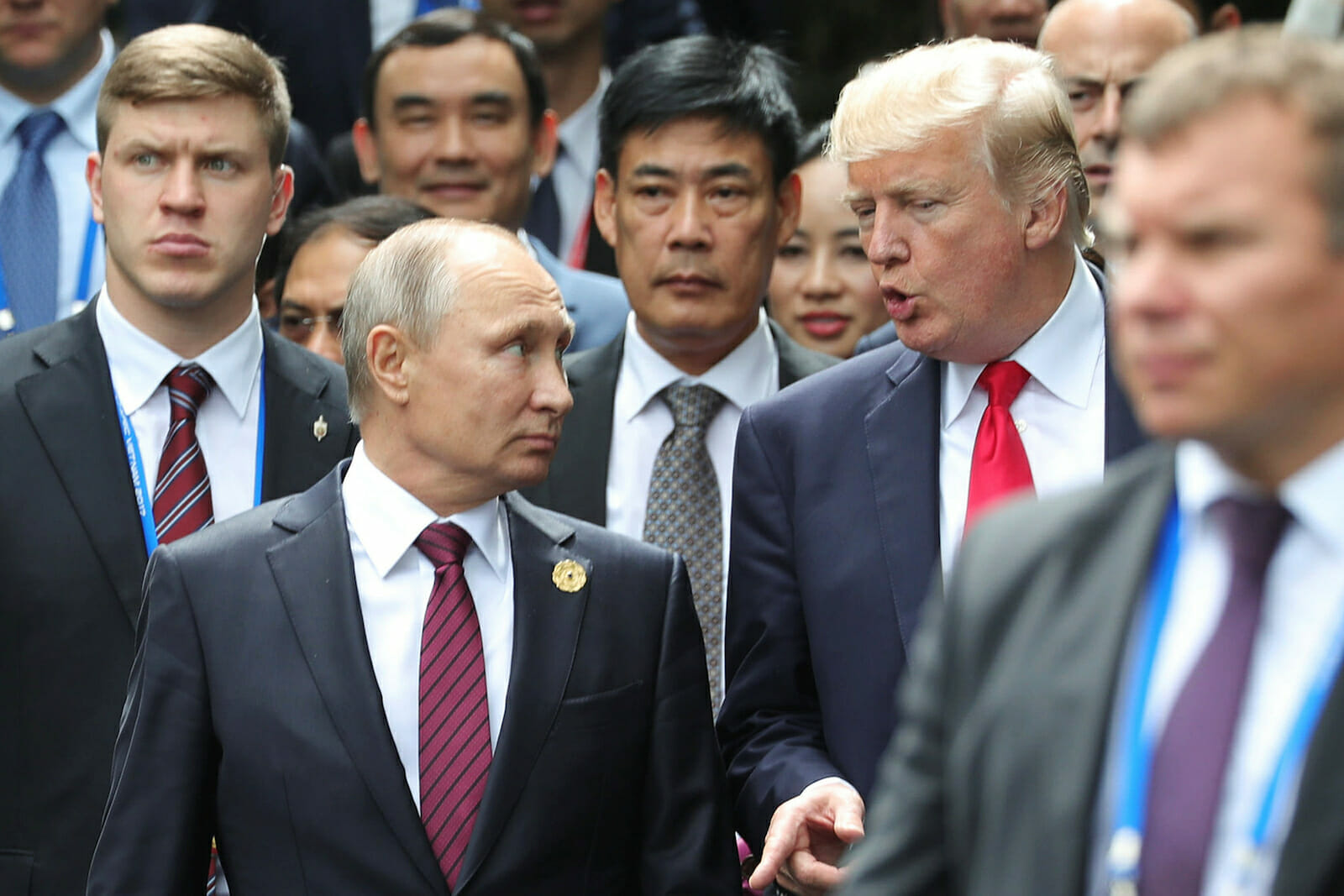
The West Needs to Seek an Accommodation with Russia
Since the overthrow of the elected government of Ukraine in 2014, with the economic and political support of the West and the seizure of the Crimea by Russia, relations between Russia and the West have deteriorated to a point where Russia, faced with what she regards as an existential threat from the West, is seeking a temporary economic, political and military alliance with China. The continuing crisis between the West and Russia is spiraling out of control and has reached a point where the West is in danger of losing its economic and political dominance in the world balance of power. Before the political miscalculations of the West forces Russia to seek a more permanent alliance with China, the West needs to re-examine its behavior towards Russia and seek a political solution to the short-sighted geopolitical aggression that was begun by the West.
The Yalta Conference and the Percentages Agreement
After the end of the Second World War, Germany was divided between the forces of the western allies and Russia. The allies had agreed that the Soviet Union would occupy Eastern Germany and that the Soviet Union’s sphere of influence would be the eastern part of Germany at the Yalta Conference in 1945. Included in the Russian sphere of influence would be Poland, Romania, Hungary, and Bulgaria. However, these spheres of influence which emerged at the end of the Second World War had not been discussed at Yalta, but at a private meeting that the United States was not a party to.
The Soviet Union and the United Kingdom had met in Moscow, prior to the Yalta conference, called the Moscow Conference, where Stalin and Churchill had agreed to these terms. This side agreement between the Soviet Union and the United Kingdom came to be known as the “Percentages Agreement.” While President Roosevelt had been represented at the Moscow Conference by Roosevelt’s friend and confidant, Averill Harriman, Ambassador Harriman was not present at this meeting, and the results of the meeting were not shared with him, or with the U.S. government.
Of the 4 countries involved in these spheres of influence, only Poland was not involved in the war between Nazi Germany and the Soviet Union. While Bulgaria did not join in the land invasion of the Soviet Union in 1941, its navy did attack elements of the Soviet fleet during Operation Barbarossa in 1941 and laid mines in the Black Sea which led to the sinking of 4 Russian submarines. Romania and Hungary both contributed significant military forces in Operation Barbarossa and in Case Blue. Poland being occupied by Nazi Germany after the beginning of Operation Barbarossa contributed nothing, but historically Poland has been a land corridor for the invasion of Russia since the middle ages. Stalin sought a defensive belt between Russia and the West, given that in the last 200 years, Russia has been invaded by the West 4 times. Until the fall of the Berlin Wall, Russia was secure behind her “spheres of influence,” knowing that before any invasion force could get to Russian soil again, any invading army would have to travel through a buffer country where the Russian army could prevent any invading force from entering Russian soil.
The West’s Geo-Political Aggression after the Cold War
Towards the end of the Cold War, and after the fall of the Berlin Wall, the most pressing problem facing Europe and Russia at the time was the political question of the reunification of Germany. To achieve a peaceful reunification between then West Germany and East Germany, the West needed the acquiescence of the then Soviet Union. In a meeting held between then-Secretary of State James Baker and Soviet Premier Gorbachev in February of 1990, the United States suggested “that in exchange for cooperation on Germany, the U.S. could make iron-clad guarantees that NATO would not expand one inch eastward.”
It was only after receiving these “iron-clad guarantees” that Premier Gorbachev agreed to the reunification talks. Not two weeks later, the U.S. began laying the foundation to bring Eastern Europe into the West’s sphere of influence and to begin the process of advancing NATO to the very frontiers of Russia. From 2004 to 2019, NATO has added the following countries to its membership: Poland, Hungary, the Czech Republic, Bulgaria, Estonia, Latvia, Lithuania, Romania, Slovakia, and Slovenia. In 2019, the countries of recognized Bosnia, Herzegovina, Georgia, North Macedonia, and Ukraine were regarded as “aspiring members” into NATO.
Since the fall of the Berlin Wall, the West has forced Russia into a corner and forced her to seek allies, no matter how dangerous they are to Russia, to defend itself against the strategic aggression of the West. It is actually mind-boggling that the leadership of the West is blind to the history of Russia, specifically the history of the Rapallo Treaty of 1922 and the Non-Aggression Treaty with Nazi Germany of 1939.
The Treaty of Rapallo and the German-Russian Non-Aggression Treaty
Russia in the past has made alliances with dangerous competitors before when she has been isolated from the world community. In 1922, shunned by the West, the Soviet Union reached out to her traditional enemy Germany and signed the Rapallo Treaty whereupon both countries renounced all territorial and financial claims against one another. They normalized diplomatic relations and began cooperating with one another in elaborate military training.
Later, in 1939, Stalin sensing that conflict in Europe was inevitable, began talks with the West seeking an alliance with the United Kingdom, and France against Nazi Germany. Negotiations began in early 1939 but were inconclusive. With Stalin believing that an agreement with the West was impossible, he began to listen to German entreaties for a non-aggression pact and authorized his foreign minister, Vyacheslav Molotov, to open talks with the Germans. On August 23, 1939, the German foreign minister Joachim Von Ribbentrop traveled to Moscow in order to sign the Molotov-Ribbentrop Pact. Eight days later on September 1, 1939, Nazi Germany invaded Poland and the Second World War began.
Russian and Chinese Military Cooperation
With Russia isolated from the West due to its annexation of the Crimea, which was done by Putin, as Putin believed that the overthrow of a democratically elected government in Ukraine posed an existential threat to Russia, Russia has moved closer to China, just as she did with the Weimar Republic in Germany in 1922 with the Rapallo Treaty and then later with Nazi Germany with the Molotov-Ribbentrop Treaty in 1939.
When the West imposed sanctions on Russia after Russia’s annexation of the Crimean Peninsula, Russia being isolated in the world began to move closer to China. And this dynamic in world politics has emboldened China in its aggression in the South China Sea and in South East Asia since at this point in time China does not have to worry about her northern border with Russia.
From joint air patrols in South East Asia, to land-based military exercises in September of 2019 in Siberia, the increasing presence of the Chinese military in the Arctic under the sponsorship of Russia in 2019, and the stated goal of increasing trade between the two countries to $200 billion per annum by the year 2024, the economic, political and military interests of the two countries are growing to the detriment of the United States and Western Europe.
Russia realizes that China in the future can also be an existential threat, but with NATO advancing right up to the political frontiers of Russia, Russia believes that the West at this time is the most dangerous immediate threat, and is playing the China card to help protect its western borders from further encroachment by NATO.
From a perspective of world politics and strategic analysis, China with its blatant theft of intellectual property rights, its military aggression in the South China Sea and its Belt and Road Initiative is the most dangerous threat to the current world order. If China is to be successfully countered without the use of organized military violence, then the West needs to come to a political solution to the current hostility between the West and Russia. Only this way, can the world avoid a clash of arms between the West and China, which is aided and supported by an estranged Russia.
